China Dolls Read online
China Dolls is a work of historical fiction. Apart from the well-known actual people, events, and locales that figure into the narrative, all names, characters, places, and incidents are products of the author’s imagination or are used fictitiously.
Copyright © 2014 by Lisa See
All rights reserved.
Published in the United States by Random House, an imprint and division of Random House LLC, a Penguin Random House Company, New York.
RANDOM HOUSE and the HOUSE colophon are registered trademarks of Random House LLC.
Library of Congress Cataloging-in-Publication Data
See, Lisa.
China Dolls: a novel/Lisa See.
pages cm
ISBN 978-0-8129-9289-2
eBook ISBN 978-0-679-64416-3
1. Female friendship—Fiction. 2. Chinese American women—Fiction. 3. Japanese American women—Fiction. 4. Betrayal—Fiction. 5. World War, 1939–1945—California—Fiction. 6. Chinatown (San Francisco, Calif.)—Fiction. 7. Historical fiction.
I. Title.
PS3569.E3334C47 2014
813′.54—dc23
2013050796
www.atrandom.com
Title-page and part-title image
copyright © iStockphoto.com / © exxorian
Jacket design: Kathleen DiGrado
Jacket images: Song Jialin/Lao Yuefenpai/Shanghai Pictorial Press (woman), © Giorgio Fochesato/Getty Images (bridge)
v3.1
Only three things cannot be long hidden:
the sun,
the moon,
and the truth.
(Attributed to Buddha)
Contents
Cover
Title Page
Copyright
Epigraph
Part One - The Sun: October 1938–July 1940
Grace: A Measly Girl
Helen: Calling to the Heavens
Ruby: A Real Chinese Girl
Grace: A Few Glorious Minutes
Helen: White Snow Blossoms
Ruby: A Lone Wolf
Grace: Pistols and a Cowboy Hat
Grace: Let the Boy Talk
Part Two - The Moon: August 1940–September 1945
Helen: Carried by the Wind
Helen: A Tide of Emotions
Ruby: Wisps of Clouds
Grace: Just a Kid
Ruby: The Jimjams
Grace: Extreme Joy Begets …
Grace: Dancing on the Edge
Grace: A Succulent Dish
Ruby: Whirlpool Valley
Grace: Good Luck, Bad Luck
Helen: Sequins, Top Hats, Chiffon
Grace: Every Particle of Happiness
Letters
Grace: A Wind-Chime Voice
Ruby: Dying Ashes Will Burn Again
Helen: V for Victory
Part Three - The Truth: December 1945–June 1948
Ruby: Sunny-Side Up
Grace: Woo Woo of the Week
Helen: A Camellia Drops
Grace: Movie Talk
Ruby: The Dark Shadow Side
November 1988
Grace: Once a Chorus Girl
Acknowledgments
Dedication
Other Books by This Author
About the Author
GRACE
A Measly Girl
I traveled west—alone—on the cheapest bus routes I could find. Every mile took me farther from Plain City, Ohio, where I’d been a flyspeck on the wallpaper of small-town life. Each new state I passed through loosened another rope around my heart, my legs, my arms, yet my whole body ached and I couldn’t shake my vertigo. I lived on aspirin, crackers, and soda pop. I cried and cried and cried. On the eighth day, California. Many hours after crossing the boundary, I got off the bus and pulled my sweater a little more tightly around me. I expected sun and warmth, but on that October afternoon, fog hung over San Francisco, damp, and shockingly cold.
Picking up my suitcase, I left the bus station and started to walk. The receptionists at the cheap hotels I visited told me they were full. “Go to Chinatown,” they suggested. “You can get a room there.” I had no idea where Chinatown was, so that didn’t help me. And I’ll say this about San Francisco: lots of hills, water on practically every side, and, it seemed to me, not a single street ran purely in any one direction. Finally, a man at a fleabag took my money—a dollar a day, in advance—and gave me a key to a room.
I washed my hair in the basin and put it up in pin curls, then leaned in to the mirror to examine what remained of my injuries. My forehead had healed completely, but the inside of my skull continued to swim from being banged against the kitchen floor. The skin over my ribs was mottled green, gray, and purple. My shoulder still felt swollen and stiff from being dislocated and then jammed back into place, but the cut on my lip had nearly disappeared. I turned away and sat on the edge of the bed, hungry but too frightened to go out, and listening to the sound of God knows what coming through the walls.
I opened my purse and pulled out the magazine clipping Miss Miller, who’d taught me dance from the age of four, had torn from a magazine and given to me a few months earlier. I smoothed the advertisement with my palm so I could study the artist’s sketch of the Golden Gate International Exposition. Even its location on Treasure Island seemed to beckon. “See, Grace, they’re looking for six thousand workers,” Miss Miller had said. “Dancers, singers, welders, carpenters. The whole works.” She’d sighed then. “I wanted to go so many places when I was young, but it takes guts—and talent—to leave everything and everyone you know. You could do it, though.” Her few words and that slip of paper had given me the courage to believe I actually could. After all, I’d won first prize at the Plain City Fair for my tap dancing and singing when I was seven and had held the title ever since.
You always planned to leave home, I told myself. Just because you had to escape sooner than expected doesn’t mean you can’t still fly to the stars.
But my pep talk—in a scary hotel room, in a strange city, in the middle of the night—did little to ease my fears. Once in bed, I could practically see the walls closing in around me. To calm myself, I began a routine I’d invented as a small child, running my hands the length of my arms (a broken tibia when I was three; my mom told Doc Haverford I fell down the stairs), slipping along my sides (several broken and fractured ribs over the years), and then lifting each leg and squeezing all the way to my feet (my legs had been a frequent target until I started dancing). The ritual both strengthened and soothed me. I was now alone in the world, with no home to return to and no one to rely on, but if I could survive my father’s beatings and the petty prejudices of my hometown, then I could triumph over whatever obstacles the future threw my way. Maybe. Hopefully.
THE NEXT MORNING, I combed out my hair, sweeping up the sides and letting the curls billow below, the way Carole Lombard did in My Man Godfrey. I put on the dress my dad bought for me when he took us to Cincinnati to buy supplies for the laundry. I’d chosen a dusty-rose-colored cotton frock, with a geometric print composed of interlocking mustard-yellow and steel-gray squares. Mom said the pattern of the fabric and cut of the dress looked too mature for me—and maybe that was so—but now I considered myself lucky to be wearing something so sophisticated.
Filled with a sense of determination, I went downstairs and onto the street. I asked directions on nearly every corner and managed to find my way to the Ferry Building, where I boarded the boat to Treasure Island, about halfway across the bay and just under the Bay Bridge. I imagined everyone onboard was seeking a job at the Golden Gate International Exposition. As excited as I was, the pulse of the ferry through the choppy water roused my vertigo and my hunger until I felt, once again, dizzy and sick. Once we reached the dock, everyone walked fast, want
ing to be first in line for interviews. Me too. I spotted my first palm trees, which was thrilling because they meant I surely was in California. I’d never seen anything like the fair’s entrance. Giant towers composed of stacked cubes crowned by stylized elephants bookended the gate. Beyond, I glimpsed spires still clothed in scaffolding. My ears pounded from the sounds of hammers, the buzz of electric saws, the rumble of tractors, bulldozers, and flatbed trucks, and the shouts of men calling out orders and cursing the way they do on construction sites.
“Will they be done on time?” a man’s voice asked very close to my ear.
I jumped, spiraling into the terror I experienced around my dad. I swung around to find a young Occidental man about six feet tall, with broad shoulders and sandy-colored hair. He put up his hands in surrender.
“I’m sorry I scared you.” His mouth spread into a contrite smile as I met his deep blue eyes. He looked older than I—maybe around twenty. He extended his hand. “My name’s Joe.”
“I’m Grace.” No last names. I liked that.
“I’m looking for a job as a rolling-chair boy.” He didn’t bother to explain what that was. “But the real reason I’m here is that I love planes, and I love to fly.”
Up ahead, the others from the ferry disappeared through the gate.
“I love planes so much that my parents told me if I got straight As in high school they’d let me take flying lessons,” Joe continued, sure of my interest. “I trained in a Piper Cub. I learned how to take off, land, what to do in a stall, and how to pull out of a spin. Now I have my pilot’s license.”
This told me, among other things, that his family had to be pretty well-off.
“What does that have to do with rolling chairs?”
He laughed and ran a hand through his hair. “Pan Am’s Clipper ships are going to be taking off and landing right here at Treasure Island!”
I nodded, pretending interest when I didn’t know what in the heck he was talking about.
“I’ve been chewing your ear off,” Joe acknowledged. “Sorry about that. What are you doing here?”
“I’m a dancer.”
“Neat.” He pointed his chin toward the gate. “We’d better catch up.”
When I stumbled a bit in my low-slung heels, he grabbed my arm to steady me, and I instinctively pulled away. His eyes went banjo big. I could tell he was about to apologize again.
“Where are you from?” I blurted, hoping to shift his attention.
“Winnetka, Illinois. I’m going to Cal.” Seeing my confusion, he explained, “The University of California. It’s over there.” He pointed east. “In Berkeley. I live in a fraternity house. How about you?”
“Plain City, Ohio.”
“Haven’t heard of it, but we’re both from the Midwest, and our states are practically neighbors. Friends?”
I nodded. He sure was a nice guy—good-looking, and I liked the way the left side of his mouth tweaked up when he smiled.
“Whew!” He wiped his forehead in mock relief.
He was funny too.
When we had all reached the trailer, a man—wearing gray flannel trousers, a leather jacket zipped halfway up his chest, and a charcoal-colored trilby pulled down to shield his eyes from the sun—jumped on a crate and spoke above the din around us: “A lot of you have come from far away. That’s great! We need plenty of folks to get this place up and running. If you’re a painter, electrician, or plumber, head over to the Court of the Seven Seas. Harry will lead the way.”
Half the folks followed the man pointed out as Harry.
“I figure the rest of you are here to apply for either service or performance jobs,” the man in the trilby continued. “If you want to drive one of the elephant trams, work in a concession, become a rolling-chair boy, barker, waitress, fireman, or cop, then go to the Court of Flowers. No flowers there yet, just another trailer like this one.”
“That’s my cue,” Joe whispered. Then, “Good luck!”
He peeled away with a large group. He turned to look back at me, gave me a thumbs-up and another smile, both of which I returned. He strode with such confidence that dust kicked up around his shoes. Through the racket around me, I could just make out him whistling “All of Me.” I loved that song.
The man in the hat sized up those who remained. “All right then,” he said. “If you’re here to be models, dancers, or musicians, you’re with me. I’ll see you one at a time. After a preliminary look-see, I’ll send you on to auditions. If you make the cut … Aw, hell,” he said with a casual wave of his hand. “You know the drill. Line up here.”
One person after another entered the trailer and then exited five or so minutes later with either a grin or a grimace. I tried to prepare myself for the questions I might be asked about my dance experience, and once again my father came into my mind. He may have beat me at home, but he liked to boast to others about how many ribbons and apple-pie prizes I’d won. He’d pushed me to be an “all-American girl,” which meant that he let me go to the Rialto to watch musicals to inspire me to practice even harder. I adored Eleanor Powell in Broadway Melody of 1936, in which she danced without music. I saw that movie maybe ten times, and then tried to re-create her steps at every opportunity: on the sidewalk outside the theater, at Miss Miller’s studio, and in our family’s laundry. Of course, the kids in school made fun of me when I said I wanted to be a star. “You? An Oriental girl?” They had a point. It wasn’t like there were any famous Chinese movie stars apart from Anna May Wong, and she didn’t sing or dance as far as I knew. Then I saw Dorothy Toy and Paul Wing—a Chinese dance team—in the whimsically titled With Best Dishes. I decided if they could make it, why not me? But would any of that help me now? I suddenly felt very apprehensive and very alone.
When my turn came, I entered the trailer and closed the door behind me as I’d seen others do. The man motioned for me to sit.
“Your name?”
“Grace Lee.”
“How old are you?”
“Old enough to sing and dance,” I answered pertly. I wanted to be a star, so no matter how desperate I was, I had to act like one. “I’m good.”
The man pinched his chin as he considered my response.
“You’re Oriental,” he observed, “and you’re quite the knockout. Problem is, I don’t have anything for you.”
I opened my purse, pulled out Miss Miller’s clipping, and pushed it across the desk. “It says here you need performers for the Cavalcade of the Golden West—”
“That’s a big show. Hundreds of performers. But I don’t need an Oriental girl.”
“What about at the Japanese Pavilion?” I asked, my false confidence instantly eroding. “I came from so far away. I really need a job.”
“It’s the Depression, kid. Everyone needs a job.” He glanced again at my application. “And I hate to break it to you, but you aren’t Japanese. Grace Lee, that’s Chinese, right?”
“Will anyone know?”
“Kid, I doubt anyone can tell the difference. Can you?”
I shrugged. I’d never seen a Japanese. I’d never seen a Chinese either other than my mother, my father, and my own reflection in the mirror—and Anna May Wong, Toy and Wing, and a couple of Orientals playing maids and butlers on the silver screen, but those weren’t in real life—so how could I be certain of the difference between a Japanese and a Chinese? I only knew my mother’s thin cheeks and chapped hands and my father’s weathered face and wiry arms. Like that, my eyes began to well. What if I failed? What if I had to go home?
“We don’t have Orientals where I’m from,” I admitted, “but I’ve always heard that they all look alike.”
“Be that as it may, I’ve been told to be authentic …” He snapped his fingers. “I’ve got it. There’s going to be a Chinese Village. Those folks are doing their own hiring. Maybe I can get you set as a dancer from China.”
“I’m not from China. I was born here.”
Unconcerned, he picked up the phone. I listened
as he suggested me to the person I assumed was in charge of the Chinese Village. He dropped the receiver back in the cradle. “They aren’t hiring dancers in a permanent way. With all the troubles in China, it wouldn’t be right.”
Troubles in China? I’d read about Germany’s aggression in Europe in the Plain City Advocate, but the newspaper came out only once a week. It barely covered events in Europe and never in Asia, so I was ignorant about all things Chinese except Chinese rice wine, which my mom made and sold out our back door on Friday and Saturday nights to the men in Plain City—a place as dry as chalk even after Prohibition ended. My mind pondered these things, but they were just a diversion from my panic.
“What about on the Gayway?” I remembered that from Miss Miller’s advertisement.
“That’s a carnival. I don’t see you there at all.”
“I’ve been to a carnival before—”
“Not like this one.”
“I can do it,” I insisted, but he’d better not try sending me to a hoochie-coochie tent like they had for men at the Plain City Fair. I’d never do that.
He shook his head. “You’re a regular China doll. If I put you in the Gayway, the men would eat you up.”
My five minutes were done, but the man didn’t dismiss me. Instead, he stared at me, taking in my dress, my shoes, the way I’d curled and combed my hair. I lowered my eyes and sat quietly. Perhaps it was proof of how the most innocent can remain safe—or that the man really was of good character—that he didn’t try or even suggest any funny business.
“I’ll do anything,” I said, my voice now shaking, “even if it’s boring or menial—”
“That’s not the way to sell yourself, kid.”
“I could work in a hamburger stand if I had to. Maybe one of the performers in the Cavalcade of the Golden West will get sick. You should have someone like me around, just in case.”
“You can try the concessions,” he responded dubiously. “But you’ve got a big problem. Your gams are good, and your contours and promontories are in the right places. You’ve got a face that could crush a lily. But your accent—”
“My accent?”

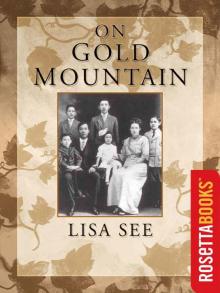 On Gold Mountain: The One-Hundred-Year Odyssey of My Chinese-American Family
On Gold Mountain: The One-Hundred-Year Odyssey of My Chinese-American Family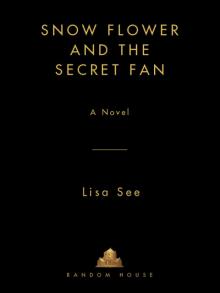 Snow Flower and the Secret Fan
Snow Flower and the Secret Fan Peony in Love
Peony in Love Flower Net
Flower Net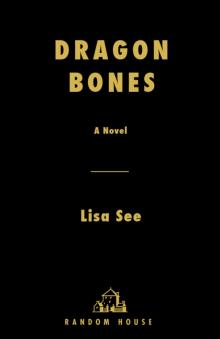 Dragon Bones
Dragon Bones Shanghai Girls
Shanghai Girls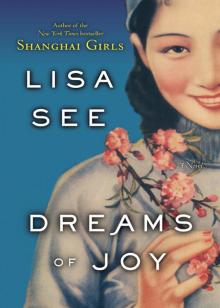 Dreams of Joy
Dreams of Joy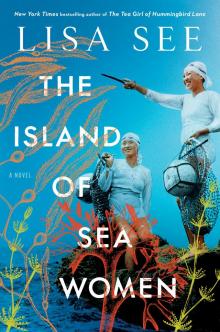 The Island of Sea Women
The Island of Sea Women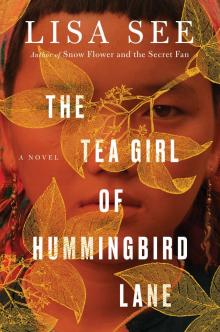 The Tea Girl of Hummingbird Lane
The Tea Girl of Hummingbird Lane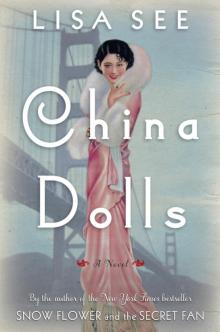 China Dolls
China Dolls The Interior
The Interior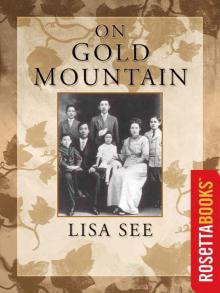 On Gold Mountain
On Gold Mountain